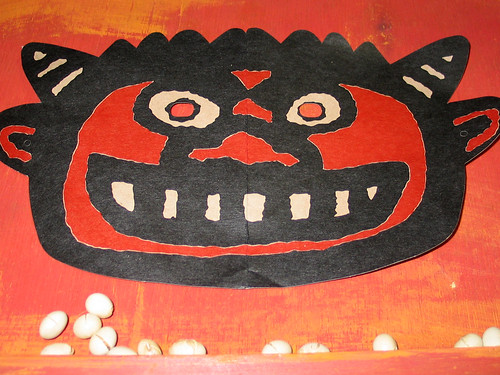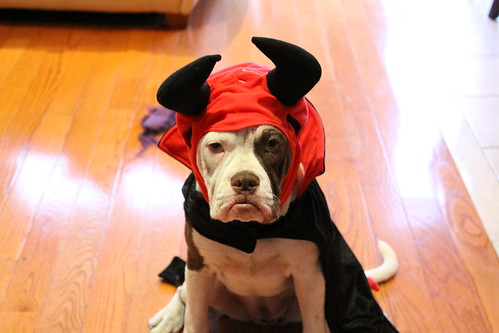Welcome to the first installment of our new series, Word Soup! While the television show The Soup brings you “the strange, obscure and totally unbelievable moments in pop culture, celebrity news and reality TV,” Word Soup will bring you those strange, obscure, unbelievable (and sometimes NSFW) words.
Apparition American
Detective Kate Beckett: “If you say ghost, I’m sending you home.”
Richard Castle (writer/consultant): “Apparition American.”
“Demons,” Castle, October 24, 2011
Apparition American plays on terms such as African American and Asian American. Just as African American is an alternative to black, Apparition American is an alternative to ghost.
bump it
Lisa: “You started dressing like a tacky suburban girl. You bumped it.”
“Halloween,” Suburgatory, October 26, 2011
Bumping it refers to adding volume to one’s hair with a “hair volumizing insert” called the Bumpit, a style presumably often worn by girls and women living in the suburbs.
Britta
Jeff: “You probably just Britta’d the test results.”
Britta: “Wait, are people using my name to mean ‘make a small mistake’?”
Jeff: “Yes.”
“Horror,” Community, October 27, 2011
An eponym is “a word or name derived from the name of a person.” Another example is bowdlerize, “to expurgate in editing by expunging words or passages considered offensive or indelicate,” named for Thomas Bowdler, “who published an expurgated edition of Shakespeare in 1818.”
End O’Potamia
Jon Stewart: “It’s over! It’s finally over! Oh man, let me say this – woohoo!”
October 24, 2011, The Daily Show with Jon Stewart
End O’Potamia refers to President Obama’s announcement that the U.S. will pull troops out of Iraq by the end of the year, thereby ending the U.S. occupation in Iraq. End O’Potamia plays on another term, Mess O’Potamia, coined by Stewart in 2003 and referring to the war in Iraq. The term is a blend of mess and Mesopotamia, an ancient region of Iraq.
fluffer
Marcy: “Your house has no style. You need a fluffer.”
“Halloween, Part 1,” American Horror Story, October 26, 2011
While the original definition of fluffer is, shall we say, NSFW, a fluffer in real estate terms refers to house fluffer, according to Word Spy, “a decorator who recommends improvements and renovations designed to maximize a house’s sale price.”
Jesus Ween
News announcer: “Halloween is less than two weeks away, and a Christian group in Texas is promoting a faith-based alternative to the usual sexy costumes we see, evil zombies, and other ungodly characters, as they call them. Their alternative is something called Jesus Ween. The group is asking Christians to dress in white and hand out Bibles instead of candy.”
October 26, 2011, The Colbert Report
In the word Jesus Ween, Jesus takes the place of the hallow in Halloween. However, hallow already means “holy person, saint,” while een is a form of even, or evening.
Statler and Waldorf
Jon Stewart: “For the guys who bear a good amount of responsibility for getting us into this clusterfuck [the war in Iraq], to go all Statler and Waldorf on the exit – unacceptable!”
October 24, 2011, The Daily Show with Jon Stewart
Statler and Waldorf refer to two Muppets characters, “two ornery, disagreeable old men” who spend the show “heckling the rest of the cast from their balcony seats.” To go Statler and Waldorf means to behave as such, heckling and criticizing others’ actions from a safe distance.
turfucken
Pat Robertson: “You got somebody who’s really weird, and his sexual orientation is he likes to have sex with ducks, is he protected under hate crime?”
Jon Stewart: “First of all, it’s called a turfucken. Second of all, if the sex with the duck is consensual, then I would say yes he’s protected.”
October 25, 2011, The Daily Show with Jon Stewart
Turfucken is a play on turducken, “a dish consisting of a deboned turkey stuffed with a deboned duck that has been stuffed with a small deboned chicken, and also containing stuffing.”
volumptuous
Snooki: “If I were to wear two bras, this is what it would like. It just like pushes them and makes them look volumptuous, if that’s the word.”
October 25, 2011, Jimmy Kimmel Live
Presumably Snooki means voluptuous here, but has inadvertently blended voluptuous and lump, perhaps thinking of lady lumps.
Now we want you on the action. If you see any Word Soup-worthy words, let us know on Twitter with the hashtag #wordsoup. Your word and Twitter handle might appear right here!


